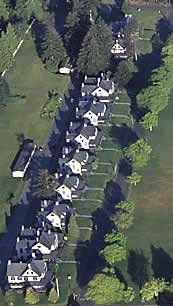Excerpts from the interview with April N. Miller of New York, NY conducted by phone from the Fort Worden History Center on February 7, 2012 by Eleanor Rigby. Ms. Miller is the daughter of Marshall Earl Miller and Muriel Smock Miller Severns. Her father was the chaplain at the Fort Worden Juvenile Diagnostic and Treatment Center from 1962 until it closed in 1971.
Her mother was a teacher in the Port Townsend school district. She had a choir that was composed of the Fort residents. Here Ms. Miller describes growing up at the Fort.
Complete transcripts and recordings of this and all interviews conducted for the Fort Worden Oral History Program are available at a nominal fee to cover duplicating and shipping. Inquire at info@fwfriends.org or 360.344.4481 for details.
“ We didn’t have a TV for a while. It seemed like everyone else had a TV but us for a long time, so we watched TV at other kids’ houses. But TV wasn’t such a central aspect of our lives like it seems to be with people’s lives nowadays.We played a lot outside. In those days,you could leave the house and be gone for hours and hours and hours. Our parents weren’t really sure where we were and what we were doing at all.
We used to play in the evenings on the parade field and the baseball diamonds. So when the Fort residents weren’t playing there, we would play on a different diamond. We weren’t allowed to play on the tennis court. We’d ride our bikes around all over the Fort.
When I was 10, my father bought me a large pony. We bought a piece of property that is across the street from the military cemetery. It was a big overgrown piece of land. My dad fenced it in with barbed wire and we cleared the brush out. We kept my pony there across from the cemetery. I spent a lot of time running around on my horse. There were other kids on the Fort who also had horses. We’d go out on the weekends, just be gone for hours and hours. We didn’t run around with our horses around the Fort because we really weren’t supposed to do that. On the hill up behind Officers Row we used to tie our horses up to some of the trees back there and put them on a long rope and they’d graze up there.Sometimes I’d keep my horse there for a couple of days and I’d throw her hay and bring her water. The Fort let us do that. The horse didn’t live there but they didn’t seem to mind if we would do that here and there every once in a while.
My younger brothers weren’t allowed to go to the other bunkers up on the top of Artillery Hill at the Fort. That was all fenced off, but my brothers would sneak up there all the time and play and hide from the security guys who would come up checking things out. They did that all the time. We’d go to the beach and play, go to the beach and make bonfires. We’d go looking for beach glass and little pieces of driftwood and stuff like that, just kind of hang out and have fun. We went into those houses on Officers Row a lot and played together, different houses.
It was very fun because there was always someone to play with. I did a huge amount of babysitting in middle school and in high school. I was always babysitting younger kids on the block. I belonged to 4-H, so I’d go to 4-H meetings. I rode in the pet parade with my horse. My family, my brothers and sisters, we were in the kiddie parade for many years with different ribbons for our costumes. With my 4-H group I rode my horse in the Rhody Parade with all of us on our horses. I did that a number of years in a row. I took my horse and was at the Jefferson County Fair, and I won ribbons on my horse there.
For a couple of years there was, I think he was either a house parent or a social worker, but his name was Jody Stewart. He had been part of the mounted Army years ago. On Saturdays, he taught a group of us dressage work with our horses at the fairgrounds for free. I and some other kids who were in 4-H wanted to learn about riding would go there on Saturday mornings and he would work with us with our horses. I was just a kid when he did that. I was really young. The other girls were older than I was and they also had better horses. I just had a pony. That was a connection with the Fort somehow that happened with another adult. For me all this horsey stuff went on, he taught us how to jump our horses and stuff. That was a really big deal to me, because at that time the only horse stuff going on out there was western riding. This was very different, doing dressage work and equitation work. It was a great experience for me to have. It was great.”

